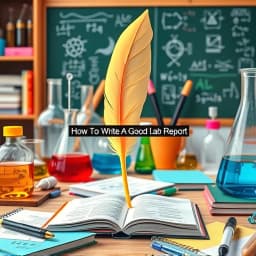
How to Write a Good Lab Report
Find this useful? Bookmark ( CTRL/CMD + D ) for quick access!
Try an example:
Biology Experiment Report
Chemistry Lab Analysis
Physics Research Summary
Environmental Science Study
Data Analysis Documentation
Engineering Project Report
Explore Similar Tools
Recent Generations
the amount paid directly to you. Yes it is possible in future cases to request direct payment to the provider, Rephrase and give me polished email.
we have processed the claim as per the attachments in the claim submission we have processedthe invoice for Saul Holding. We dont have invoice for the Salofalk.
this additional information is very important. this adiitional information was requested by our clinical team. Without clinical review claim not be paid so please share the below additional information
How To Write A Good Lab Report
How To Write A Good Lab Report is a powerful AI-powered writing assistant that helps users create clear, concise, and well-structured lab reports. This innovative solution combines advanced natural language processing with expert guidance to deliver high-quality reports that meet academic standards.
Key Capabilities
- Step-by-step guidance for structuring your lab report, ensuring all essential components are included.
- Automated formatting that adheres to various citation styles, saving time and enhancing professionalism.
- Real-time feedback on clarity and coherence, helping users refine their writing for better readability.
- Customizable templates tailored to different scientific disciplines, making it easy to adapt to specific requirements.
Who It's For
Designed for students, researchers, and educators, How To Write A Good Lab Report excels in academic settings. Whether you're a high school student tackling your first experiment or a graduate researcher preparing for publication, this tool streamlines your workflow and enhances productivity.
Why Choose How To Write A Good Lab Report
What sets How To Write A Good Lab Report apart is its intuitive interface and comprehensive support, making it the ideal solution for anyone looking to improve their scientific writing skills and produce top-notch lab reports.
Ready to transform your lab reporting process? Start using How To Write A Good Lab Report today and experience the difference in your academic writing!
Enhance Your Work with How to Write a Good Lab Report
Leverage the power of AI to streamline your tasks with our How to Write a Good Lab Report tool.
Structured Guidance
Receive step-by-step instructions on how to format and write each section of your lab report.
Template Availability
Access a variety of customizable lab report templates to streamline your writing process.
Automated Feedback
Get instant feedback on your writing style, grammar, and clarity to enhance the quality of your report.
How How to Write a Good Lab Report Works
Discover the simple process of using How to Write a Good Lab Report to improve your workflow:
Gather Your Information
Collect all necessary data and materials related to your experiment.
Choose a Template
Select from various lab report templates tailored to your field of study.
Input Your Data
Enter your experimental data and observations into the chosen template.
Generate and Review Report
Generate your lab report and review it for accuracy and completeness.
Use Cases of
How to Write a Good Lab Report
Explore the various applications of How to Write a Good Lab Report in different scenarios:
Student Lab Report Writing
Assist students in structuring and writing comprehensive lab reports for their science courses, ensuring they meet academic standards.
Research Publication Preparation
Guide researchers in preparing lab reports for publication in scientific journals, focusing on clarity, formatting, and adherence to submission guidelines.
Laboratory Training Programs
Support educators in developing training materials for laboratory courses, emphasizing the importance of effective lab report writing skills.
Peer Review Process
Facilitate the peer review process by providing a checklist and guidelines for reviewers to evaluate the quality of lab reports submitted for assessment.
Who Benefits from How to Write a Good Lab Report?
AI-Powered Efficiency
From individuals to large organizations, see who can leverage How to Write a Good Lab Report for improved productivity:
Students
Learn how to structure and present lab findings effectively for academic success.
Educators
Provide guidance and resources to help students improve their lab report writing skills.
Researchers
Enhance the clarity and professionalism of research documentation for publication.
Lab Technicians
Streamline the process of documenting experiments and results for better collaboration.
Frequently Asked Questions
What is the purpose of the 'How To Write A Good Lab Report' AI tool?
The purpose of this AI tool is to assist students and researchers in creating well-structured and comprehensive lab reports by providing guidelines, templates, and tips for effective scientific writing.
Can the AI tool help with formatting my lab report?
Yes, the AI tool includes formatting guidelines for various citation styles and report structures, ensuring that your lab report meets academic standards.
Is there a limit to the number of lab reports I can create using this tool?
No, there is no limit to the number of lab reports you can create. You can use the tool as often as needed to assist with different reports throughout your studies or research.
Does the AI provide feedback on my lab report?
Yes, the AI can analyze your lab report and provide constructive feedback on clarity, coherence, and adherence to scientific writing conventions, helping you improve your writing skills.
Is the tool suitable for all scientific disciplines?
Absolutely! The 'How To Write A Good Lab Report' AI tool is designed to be versatile and applicable across various scientific disciplines, including biology, chemistry, physics, and engineering.
































